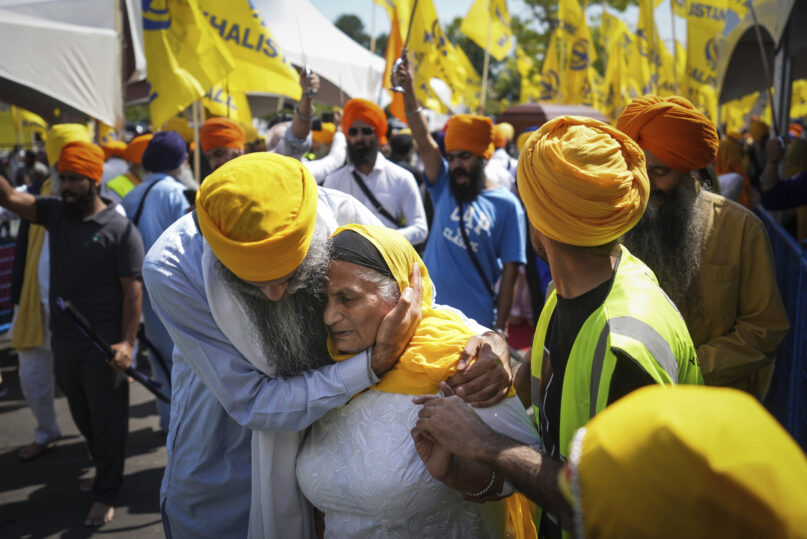(RNS) — Last week Justin Trudeau, the prime minister of Canada, told the country’s Parliament that his government had “credible reasons” to believe that agents of the Indian government may have killed a Sikh Canadian citizen, Hardeep Singh Nijjar, on Canadian soil. Canada has since said that both human intelligence and signals intelligence link Indian diplomats in Canada to the murder.
While Indian officials admit they’ve seen the evidence, India’s response has been confrontational, geopolitical and retaliatory, accusing Canada of being a “safe haven for terrorists.”
While India calls itself a pluralistic democracy, most Hindus in the country regard its religious minorities, such as Sikhs, Buddhists and Jains, as sects of Hinduism, and so far as these minorities become subservient to the larger Hindu majority interests, they are viewed as patriotic. Objectors are considered undesirable and pushed to the edges of society.
The Sikhs have been seen as problematic for India since 1947, when the British chose not to hand over the land of Punjab, the historic Sikh kingdom they had annexed in 1849, to its Sikhs inhabitants, but instead divided it between India and Pakistan. Sikhs threw in their lot with India, hoping they would experience freedom’s glow.
But the Hinduization of the Sikhs has been going on ever since, with moderate Sikhs being welcomed with open arms as the desirable type of Sikhs and more devout Sikhs being accused of supporting a separate Sikh state, which has come to be referred to as Khalistan, or “Land of the Pure” in Persian. Any effort by the Sikh community to protect its tangible and intangible heritage and interests has been viewed as separatism, even basic commitments of their faith, including keeping the five articles of Sikh faith or abstaining from alcohol and smoking. Sikhs who blend in, meanwhile, are said to be “returned to the Hindu fold.”
Concerns about Sikhs as separatists began in the 1970s but gained momentum with the June 1984 attack by the Indian army on Darbar Sahib, or Golden Temple, at Amritsar and about 40 other Sikh historic gurdwaras in Punjab. The anti-Sikh pogroms that followed the assassination of Prime Minister Indira Gandhi by her Sikh bodyguards were justified as teaching the Sikhs a lesson.
In the 1990s, the army, police, paramilitary forces and paid gangs searched out Sikhs in villages across Punjab, especially young men, and murdered them in faked clashes, throwing their bodies in canals or cremating them before they could be claimed by their loves ones. A Sikh human rights activist, Jaswant Singh Khalra, published a list of thousands of victims. In 1995, Khalra himself was abducted by police and died in police custody.
The recent rise of right-wing Hindu nationalism in India under the government of Prime Minister Narendra Modi has further complicated the situation, reducing space for all religious minorities, primarily Muslims, but including Christians, Dalits and Sikhs.
India has been suspected of undermining Canada’s sovereignty in India’s pursuit of Sikhs since at least the June 1985 bombing of an Air India flight from Canada to India. The criminal investigation took years but finally settled on two defendants who were identified as Sikh separatists, despite reporting by Zuhair Kashmeri and Brian McAndrew of The Globe and Mail in Toronto, who alleged that Indian diplomats in Canada were linked to those who carried out the bombing. They also claimed in the 1989 book “Soft Target” that “India has been engaged in a devious and ruthless operation to manipulate and destabilize Canada’s Sikh population.”
Nijjar is only the latest Sikh target to have died mysteriously outside of India recently. In July 2022, Ripudaman Singh Malik, who was acquitted in the 1985 aircraft bombing case, was shot to death in Surrey, the same Vancouver suburb where Nijjar was killed in the parking lot of the local gurdwara last week. In early May 2023 in Lahore, Pakistan, Paramjit Singh Panjwar, declared a Khalistani separatist by India, was gunned down. In June, Avtar Singh Khanda, a Khalistani independence activist, died suddenly from cancer in Birmingham, England; his relatives suspect he was poisoned.
These killings have the look of extrajudicial murders. We wouldn’t stand for such incidents in the United States, nor should anyone anywhere who believes in the rule of law and the international order. The free world must expect more from “the land of Gandhi” and hold India accountable for its actions.
(Tarunjit Singh Butalia is a founding trustee of the Sikh Council on Interfaith Relations and executive director of Religions for Peace USA. The views expressed in this commentary do not necessarily reflect those of Religion News Service.)





